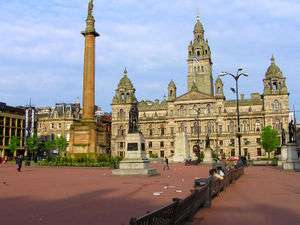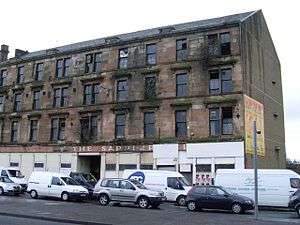Glasgow effect

The Glasgow effect refers to the unexplained poor health and low life expectancy of residents of Glasgow, Scotland, compared to the rest of the United Kingdom and Europe.
Though lower income levels are generally associated with poor health and shorter lifespan, the prevailing hypothesis among epidemiologists is that poverty alone does not appear to account for the health disparity found in Glasgow.[1][2] Equally deprived areas of the UK such as Birmingham, Liverpool and Manchester have higher life expectancies, and the wealthiest ten percent of the Glasgow population have a lower life expectancy than the same group in other cities.[n 1]
Several hypotheses have been proposed to account for the effect, including vitamin D deficiency, cold winters, higher levels of poverty than the figures suggest, high levels of stress, and social alienation.[4]
Mortality rates


Research led by David Walsh of the Glasgow Centre for Population Health in 2010 concluded that the deprivation profiles of Glasgow, Liverpool and Manchester are almost identical, but premature deaths in Glasgow are over 30 percent higher, and all deaths around 15 percent higher, across almost the entire population.[3]
The city's mortality rates are the highest in the UK and among the highest in Europe. With a population of 1.2 million in greater Glasgow, life expectancy at birth is 71.6 years for men, nearly seven years below the national average of 78.2 years, and 78 years for women, over four years below the national average of 82.3.[4] According to the World Health Organization in 2008, the life expectancy for men in the Calton area of Glasgow was 54 years.[1] A local doctor attributed this to alcohol and drug abuse, and a violent gang culture.[5]
Hypotheses
Epidemiologists are unable to explain the mortality gap, which was not apparent until 1950 and seems to have widened since the 1970s.[3] The Economist wrote in 2012: "It is as if a malign vapour rises from the Clyde at night and settles in the lungs of sleeping Glaswegians."[6]
Hypotheses include vitamin D deficiency caused by lack of sunlight, more poverty than the figures suggest, cold winters, high levels of stress, a culture of alienation,[4] and pessimism brought on by the lingering effects of industrialisation and the city's more recent deindustrialisation. Yet in comparison to other similarly deindustrialised European cities, Glasgow's 15 percent higher mortality rate persists.[6]
The Chief Medical Officer for Scotland, Harry Burns, referred in 2004 to research suggesting that chronically activated stress responses, especially in children, affect the structure of parts of the frontal lobes of the brain, and that these determine the physical reaction to stress, which could result in chronic ill health. The ability to attain good health, he suggested, depends in part on whether people feel in control of their lives, and whether they see their environments as threatening or supportive.[7]
See also
Notes
- ↑ David Walsh, Glasgow Centre for Population Health, 2010: "[R]ecent research has highlighted the existence of a 'Scottish effect', a term used to describe the higher levels of poor health experienced in Scotland over and above that explained by socio-economic circumstances. Evidence of this 'excess' being concentrated in West Central Scotland has led to discussion of a more specific 'Glasgow effect'. ..."The deprivation profiles of Glasgow, Liverpool and Manchester are almost identical. Despite this, premature deaths in Glasgow are more than 30% higher, with all deaths approximately 15% higher. This 'excess' mortality is seen across virtually the entire population: all ages (except the very young), both males and females, in deprived and non-deprived neighbourhoods. ... Analyses of historical data suggest that it is unlikely that the deprivation profile of Glasgow has changed significantly relative to Liverpool and Manchester in recent decades; however, the mortality gap appears to have widened since the early 1970s, indicating that the 'effect' may be a relatively recent phenomenon. ..."While deprivation is a fundamental determinant of health and, therefore, an important driver of mortality, it is only one part of a complex picture. As currently measured, deprivation does not explain the higher levels of mortality experienced by Glasgow in relation to two very similar UK cities. Thus, additional explanations are required."[3]
References
- 1 2 Michael Reid, "Behind the 'Glasgow effect', Bulletin of the World Health Organization, 89(10), October 2011, pp. 701–776. PMID 22084504
- ↑ P. D. Donnelly, "Explaining the Glasgow effect: could adverse childhood experiences play a role?", Public Health, 124(9), September 2010, pp. 498–499. PMID 20728908 A. J. Gavin, et al. "The Glasgow effect: useful construct or epidemiological dead end?," Public Health, 125(8), August 2011, pp. 561–562. PMID 21794886 S. D. Fraser, S. George, "Perspectives on differing health outcomes by city: Accounting for Glasgow's excess mortality", Journal of Risk Management and Healthcare Policy, 8, 17 June 2015, pp. 99–110. PMID 26124684 Phil Hanlon, "Unhealthy Glasgow: a case for ecological public health?", Public Health, 13 September 2015, pii: S0033-3506(15)00308-X. PMID 26376607
- 1 2 3 David Walsh, et al., "It's not 'just deprivation': Why do equally deprived UK cities experience different health outcomes?", Public Health, 124(9), September 2010, pp. 487–495. PMID 20223487
- 1 2 3 Ali Muriel, "Mystery of Glasgow's health problems", The Guardian, 6 November 2012. "Glasgow has lowest life expectancy in UK", BBC News, 19 October 2011. James Reid, "Excess mortality in the Glasgow conurbation: exploring the existence of a Glasgow effect", PhD thesis, University of Glasgow Faculty of Medicine, September 2008.
- ↑ "GP explains life expectancy gap", BBC News, 28 August 2008."Male life expectancy at birth", BBC News, 28 August 2008.
- 1 2 "Unhealthy Glaswegians: No city for old men", The Economist, 25 August 2012.
- ↑ Harry Burns, "How health is created: an hypothesis", Building a healthier future, Glasgow Centre for Population Health, 27 October 2004.
Further reading
- Currie, Alex; Leslie, Chris; Chivers, Richard. "Glasgow effect", glasgoweffect.com, a documentary photography project, accessed 16 November 2012.
- Gray, L.; Leyland, A. H. "Is the 'Glasgow effect' of cigarette smoking explained by socio-economic status?: a multilevel analysis," BMC Public Health, 17(9), July 2009, p. 245. PMID 19615067
- Levin, K. A. "Glasgow smiles better: an examination of adolescent mental well-being and the 'Glasgow effect'"], Public Health, 126(2), February 2012, pp. 96–103. PMID 22192383
- McCartney, Gerry, et al. "Why do males in Scotland die younger than those in England? Evidence from three prospective cohort studies", PLoS One, 7(7), 11 July 2012. PMID 22808017
